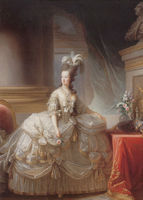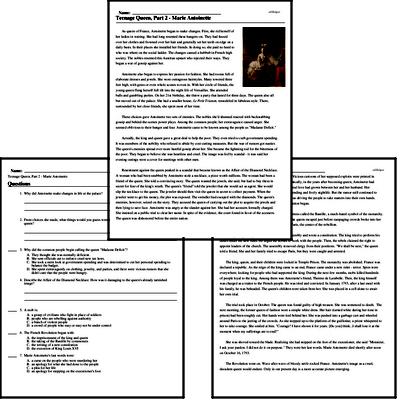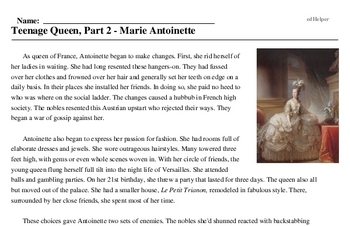Teenage Queen, Part 2 - Marie Antoinette
As queen of France, Antoinette began to make changes. First, she rid herself of her ladies in waiting. She had long resented these hangers-on. They had fussed over her clothes and frowned over her hair and generally set her teeth on edge on a daily basis. In their places she installed her friends. In doing so, she paid no heed to who was where on the social ladder. The changes caused a hubbub in French high society. The nobles resented this Austrian upstart who rejected their ways. They began a war of gossip against her.
Antoinette also began to express her passion for fashion. She had rooms full of elaborate dresses and jewels. She wore outrageous hairstyles. Many towered three feet high, with gems or even whole scenes woven in. With her circle of friends, the young queen flung herself full tilt into the night life of Versailles. She attended balls and gambling parties. On her 21st birthday, she threw a party that lasted for three days. The queen also all but moved out of the palace. She had a smaller house, Le Petit Trianon, remodeled in fabulous style. There, surrounded by her close friends, she spent most of her time.
These choices gave Antoinette two sets of enemies. The nobles she'd shunned reacted with backstabbing gossip and behind-the-scenes power plays. Among the common people, her extravagance caused anger. She seemed oblivious to their hunger and fear. Antoinette came to be known among the people as "Madame Deficit."
Actually, the king and queen gave a great deal to help the poor. They even tried to curb government spending. It was members of the nobility who refused to abide by cost-cutting measures. But the war of rumors got nastier. The queen's enemies spread ever more hateful gossip about her. She became the lightning rod for the bitterness of the poor. They began to believe she was heartless and cruel. The image was fed by scandal - it was said her evening outings were a cover for meetings with other men.
Resentment against the queen peaked in a scandal that became known as the Affair of the Diamond Necklace. A woman who had been snubbed by Antoinette stole a necklace, a piece worth millions. The woman had been a friend of the queen. She told a convincing story. The queen wanted the jewels, she said, but had to buy them in secret for fear of the king's wrath. The queen's "friend" told the jeweler that she would act as agent. She would slip the necklace to the queen. The jeweler should then visit the queen in secret to collect payment. When the jeweler went to get his money, the plot was exposed. The swindler had escaped with the diamonds. The queen's enemies, however, seized on the story. They accused the queen of carrying out the plot to acquire the jewels and then lying to save face. Antoinette was angry at the slander against her. She had her accusers formally charged. She insisted on a public trial to clear her name. In spite of the evidence, the court found in favor of the accusers. The queen was dishonored before the entire nation.



